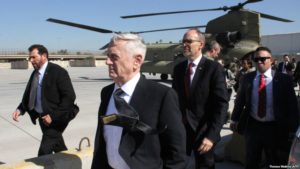Special to WorldTribune.com
Radio Free Europe / Radio Liberty
U.S. Secretary of Defense Jim Mattis has arrived in Baghdad for a previously unannounced visit focusing on the effort to defeat Islamic State (ISIS) militants.
Mattis’s arrival on Feb. 20 comes a day after Iraqi Prime Minister Haidar al-Abadi announced a new phase in the operation to rout ISIS militants from their stronghold in northern Iraq — the western side of the city of Mosul.

Mattis’s first comments in Baghdad were aimed at reassuring Iraqi leaders rattled by U.S. President Donald Trump’s campaign proposals to “take the oil in Iraq” as reimbursement for the cost of U.S. military support.
Upon his arrival, Mattis said the United States was “not in Iraq to seize anybody’s oil.”
The visit comes as the Iraqi government’s latest push to capture the western part of Mosul entered its second day.
Iraqi forces, supported by U.S.-led air strikes, have been waging a four-month urban battle to recapture Mosul from ISIS militants.
They’ve secured the neighborhoods on the east side of the Tigris River, but ISIS militants still hold the western part of the city.
Iraqi forces reported on Feb. 20 that they were pushing north toward southern Mosul and the Mosul airport, but that progress had been hampered by improvised explosive devices planted by ISIS militants.
On Feb. 19, Iraqi forces secured a series of villages west of Mosul, while forces to the south advanced to the village of Athbah.
A BBC correspondent embedded with the Iraqi troops to the south of Mosul said their advance on Feb. 19 was nearing high ground positions where government forces would be able to see Mosul Airport and have a direct line of fire on ISIS militants there.
Reuters reported later on Feb. 19 that Iraqi troops had rushed through several villages, reaching Zakrutiya, about 5 kilometers south of the airport by the end of the day.
Officers reported capturing a power station and killing several militants, including snipers.
Analysts said it was clear that taking western Mosul would be much more difficult than capturing the eastern portion of the city.
Iraqi forces say they have retaken 15IS villages approaching western Mosul from ISIS fighters, as fighting has intensified in the U.S.-backed forces’ campaign to fully liberate the crucial city.
“We are coming, Nineveh, to liberate the western side of Mosul,” Prime Minister Abadi said in a televised address on Feb. 19, referring to the province in which Mosul is located.
Backed by U.S. air strikes and bolstered by Shi’ite militias and Kurdish Peshmerga fighters, Iraqi forces in October launched their initial assault on the city where ISIS leader Abu Bakr al-Baghdadi had declared a caliphate straddling Iraq and Syria in 2014.
“West Mosul had the potential certainly of being more difficult, with house-to-house fighting on a larger and more-bloody scale,” said Patrick Skinner of the Soufan Group intelligence consultancy.
U.S. Central Command said U.S.-led coalition forces have been carrying out air strikes near Mosul in support of the latest phase of the operation.
Central Command said U.S. special forces have been embedded with some Iraqi units, which suggests they were providing ground target coordinates for laser-guided air strikes.
U.S. special operations forces have been embedded with some Iraqi units, and thousands of U.S. soldiers are in Iraq to provide logistical and other support.
Mattis said on Feb. 19 that U.S. forces “continue in the same role they were in, in east Mosul, and the coalition forces are in support of this operation.”
